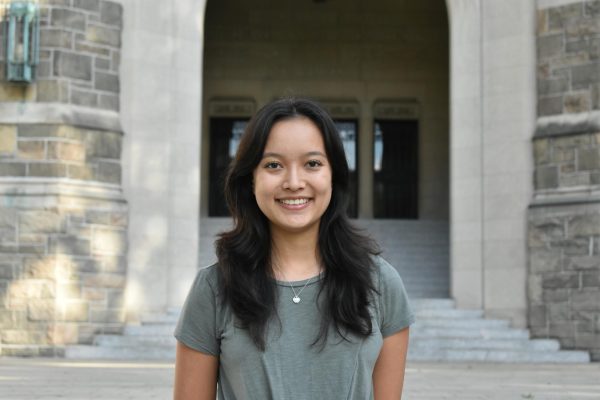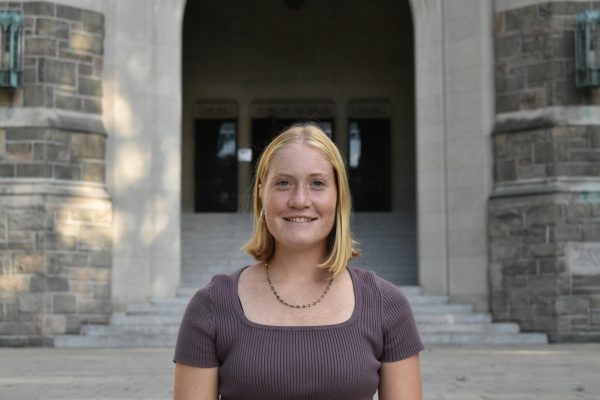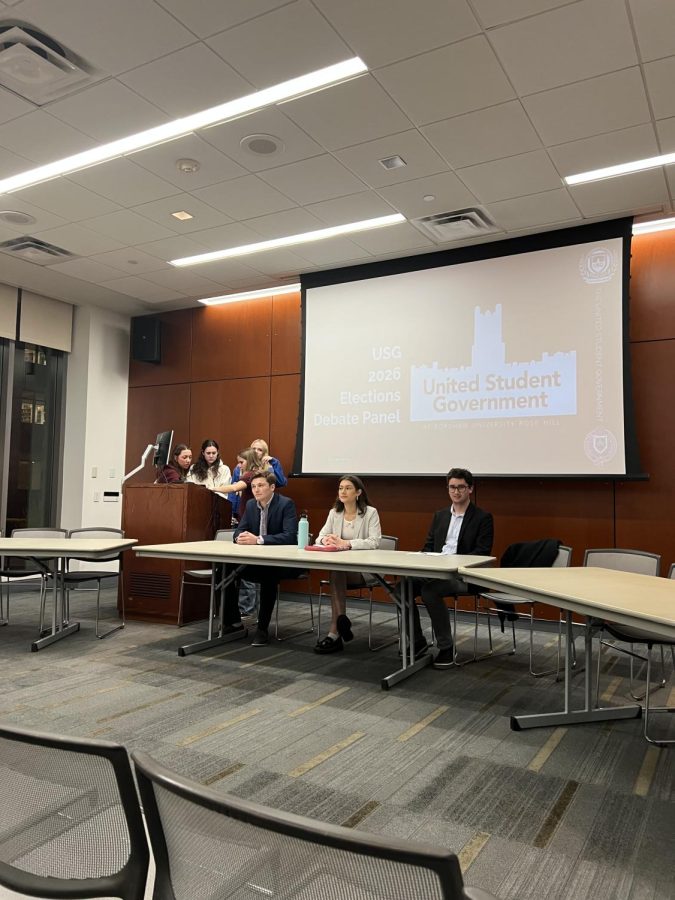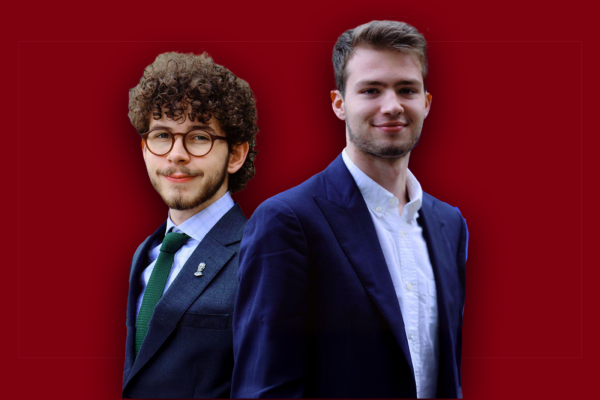USG Hosts Meet the Candidates for 2023-24 Election
On Wednesday, April 26, candidates running for the United Student Government (USG) senator positions publicly introduced themselves and presented their positions. Executive President of USG Santiago Vidal, FCRH ’23, led the event, which was moderated by The Fordham Ram.
Candidate presentations began with the class of 2026. Each of the 16 candidates were allotted 30 seconds to introduce themselves. Following introductions, both moderators and audience members were invited to ask questions.
Ananya Grover, GSB ’26, was first to present her candidate position. Grover stated that she hopes to extend financial aid resources and increase the on-campus availability of menstruation products. Isaac Muir, FCRH ’26, said that he will bring Fordham’s multicultural clubs to the senate floor regularly and emphasized a need for a student vote regarding the annual Campus Activities Board’s Spring Weekend performer. Nicholas Chipelo, GSB ’26, mentioned a need for expanding the nutritional information provided by the school. As part of his initiative, Chipelo also stated he will create programs to better unify the Fordham College of Rose Hill and the Gabelli School of Business.
Karam Youssef, GSB ’26, spoke about working to better accommodate commuter students and to provide more recognition for Middle Eastern students. Lucas Hjertberg, FCRH ’26, emphasized the need to elevate student voices. Hjertberg also said that he plans to implement a Survivor’s Advocate Position at the university. Mike Smallenberger, GSB ’26, stated that he hopes to revamp the housing selection process and create alternative fundraising ways for Fordham to generate revenue. Deborah Adebanjo, FCRH ’26, said that she hopes to better the quality of student lives by focusing on cura personalis.
Antoni Zlatanovski, FCRH ’26, emphasized the need for more commuter student activities and increased access to psychological services. Domenic Hoxholli, GSB ’26, ran on the platform that he will open Walsh Library 24 hours a day. Anthony Hayes, GSB ’26, spoke about better connecting the students and USG through more tabling and the livestreaming of USG meetings. Dylan Duong, FCRH ’26, emphasized that his lack of USG experience will not impede his fight for better student health care.
Valentina Resano, FCRH ’26, said she will improve the counseling center and the class registration process. Aidan Thompson, GSB ’26, spoke about creating an open platform for student clubs and organizations to share ideas and resources. Mikaela Casanova, GSB ’26, emphasized the need for a better guest policy and extended gym and library hours.
Michael Duke, GSB ’26, said that his platform was to provide 24/7 access to Ram Fit and to fix the class registration process. Nicola D’Abundo, FCRH ’26, spoke about increasing scholarship funding and creating an inclusive environment for all students.
Following the First-year candidates, candidates from the class of 2025 introduced themselves and fielded questions.
Zachary Visconti, GSB ’25, was first to present his candidate position. Visconti said that if elected, he will remain realistic. He spoke about creating an internship database for students. He also said that he will fight for increased transparency between the Fordham administration and the students.
Sarah Hurd, FCRH ’25, said that she hopes to better the communication between the student body and the Fordham administration. She said she will achieve this through the use of social media and the implementation of regular office hours.
Evan McManus, FCRH, ’25, said that in the past, USG has not delivered on their promises. McManus spoke about adding more outdoor seating and providing transparency from the Fordham administration regarding the tuition raise.
Lastly, the class of 2024 presented their candidate positions.
Jack Hanus, FCRH ’24, said that he is interested in working as the USG ROTC delegate. Hanus also stated that he will continue working with the USG Dining Committee to complete proposals.
Maria Narvaez, GSB ’24, spoke about expanding and upgrading the commuter student lockers.
Narvaez also mentioned that if elected, she will continue working on her proposal to offer Spanish-speaking tours at Fordham.
Charles Hearn, FCRH ’24, said that he hopes to bring a new perspective to USG. Hearn raised concerns about the effectiveness of the temporary dining options. He also stated that he will prioritize communication with the class of 2024.
Thomas DiStefano, FCRH ’24, spoke about the tuition increase, saying he will fight for transparency. DiStefano also said that he hopes to create more dining options and better the overall campus dining experience. He said he will accomplish this by joining the USG Dining Committee and the USG Budget Committee.
On Thursday, April 27, candidates running for United Student Government (USG) executive board positions presented their platforms.
The first to present their platform were Briana Al-Omoush, FCRH ’24, and Ava Coogan, FCRH ’25, who are running uncontested for president and vice president respectively. Coogan, who is currently the vice president of USG, said that communication has improved this year, but she still wants to do more, like monthly tabling in the student center. With monthly tabling, she wants to get input from students and then take that back to USG and make proposals.
Al-Omoush, current vice president of diversity and inclusion, who has been part of the USG Diversity Action Coalition since her first year, stated that she wants to promote internal changes, such as more intercommittee communication. Also, Al-Omoush stated that she wants to review the new academic advising system in FCRH and work on the way that the university collects ethnic data.
When asked about how their proposal for semesterly town halls in their platform would differ from weekly USG meetings or Student Life Council meetings, Al-Omoush explained that different senators would lead them, the topic can depend on tabling, and it will be an entirely student-run event. When asked about their goal of transparency, Al-Omoush stated that transparency started with awareness, and Coogan stated that the tabling and town hall events will give students the chance to ask questions.
The next to present their platform was Lauren Walczyk, FCRH ’25, who is running uncontested for vice president of operations. Walczyk is the current vice president of operations and has held this position since this semester. She stated the importance of mental health and LGBTQ+ trainings, especially due to a lack of awareness of the current ones. When asked about how to increase communication with clubs, Walcyzk stated that she wants to work on more concise emails, so there are less in the inbox for students to miss, and she wants to work with the Office of Student Involvement and the Office of Multicultural Affairs on this.
Next, Eron Maltzman, GSB ’25, who is running uncontested, presented his platform for vice president of finance and budgets. Maltzman is the current vice president of finance and budgets, and he stated his three goals are to ensure that committee members are staying up to date with budgets, fulfill his USG duties and ensure that club leaders are heard and all of their needs are met. Overall, he stated that he wants to increase transparency and communication between the committee and Fordham community. When asked about how to ensure the student activity fee is equitable, Maltzman explained that he will revisit the budget committee guidelines to ensure equity, and he stated that he has already made a FAQ document for clubs and implemented office hours for clubs to ask questions.
Next, Brian Inguanti, FCRH ’24, who is running uncontested, presented his platform for vice president of student life. Currently, Inguanti is the the vice president of student life, and he stated that in the past semester he has increased the committee size and had a number of programming events. He stated that he wants to work on more proposals and get access to Adobe Suite for all students. When asked about his critiques of his committee as an incumbent, Iguanti stated that there was a focus on programming, and there needs to be more policy and outreach with other clubs and departments.
The next to present their platform was Ariadna Wong, FCRH ’25, who is running uncontested for vice president of communications. Wong is currently the vice president of communications, and she stated the three main areas she wanted to work on was accessibility, innovation and engagement. When asked by an audience member if fewer words in reports would help people digest statements easier, Wong agreed that it is important to make things concise.
Next, Emma Balint, FCRH ’24, who is running uncontested, presented her platform for vice president of FCRH, a position she currently holds. Balint stated the different initiatives that she has worked on in the past semester, such as proposals to lower the cost of STEM books and a proposal to cancel class or get excused absences for students on election days. Balint stated that she wants to work on three main things: student mentorship, streamlining research opportunities and the current FCRH and Career Center one-credit course. When asked about how she continues to work on her STEM proposal, Ballint explained she plans to set up meetings with different department chairs to talk to them about the next steps.
Next, Catherine Flores, GSB ’25, presented her platform for vice president of GSB. She talked about her experience thus far on Gabelli’s Dean Council, and she talked about the different proposals she helped to implement such as allowing AP credits to count for Statistics 1 and a proposal for extended hours in Hughes Hall. Flores stated that she wants to give back to the community and work on creating a platform with local organizations. When asked about how to increase transparency to the study body, Flores stated that tabling and social media is an effective way to reach out to do that.
The next candidate, Chloe Mathewson, GSB ’24, sent a video due to being abroad. In her video, she stated that her main three goals were to better Fordham’s relationship with the New York City community, increase mentorship opportunities and ensure Dean’s Council applications are adequately reaching all members of the community.
Next, Mirei Fukushima, GSB ’25, who is running unopposed, presented her platform for vice president of diversity and inclusion. She explained that her past two years on the Diversity Action Coalition committee has given her the opportunity to help implement different events and proposals, and her role as co-vice chair of the committee has given her valuable experience. Fukushima stated that she wants to continue to expand initiatives and programming events and implement more DEI into GSB. When asked where DEI needs to be stronger in the university, Fukushima stated that DEI is often brushed over quickly because it is required, so collaboration with a club would make the process smoother.
Sean Power, FCRH ’24, who is running unopposed, presented his platform for vice president of sustainability. He talked about his different work with proposals on sustainability, and he stated his plan to introduce a kelp-based straw to campus. Power also stated that he wants to be available and visible for students. When asked about how the committee could improve, Power stated that proposals that pass are not always implemented, so he wants to work with the office of sustainability to make sure the proposals are feasible.
Jamie Serruto, FCRH ’24, also sent a video due to being abroad. Serruto, who is running unopposed, presented his platform for vice president of facilities and dining. In the video, Serruto states that he wants to work on a smooth transition with all dining operations, ensure the student voice is heard and that services that are rendered are in line with the tuition costs.
The last candidate to present was Molly Ewing, FCRH ’25, for vice president of health and security. Ewing is the current co-chair of the Committee of Sexual Misconduct, and she has been involved with USG since she was a First-year. She wants to continue the work the committee has done, such as Week of Action. When asked about aspects of Counseling and Psychological Services (CPS) that she wants to streamline as stated in her platform, Ewing said that she wants to build a relationship with CPS. She also wants to connect CPS with students who are going through the Title IX process.
After the last executive board candidate presented, the Meet the Candidates night concluded. Voting for USG representatives for the 2023-24 school year opens at 11 a.m. on Monday, May 1.

Emma Kim is a junior from Pittsburgh. She is double majoring in economics and English. She started as a contributing writer for news in her freshman year...

Grace Galbreath is a junior from Willow Grove, Pa. majoring in communications and journalism. She began writing for the Ram spring of her freshman year...









































































































































































































